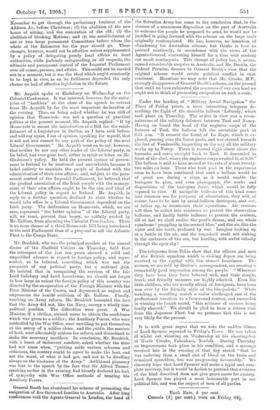Mr. Asquith spoke at Earlsferry on Wednesday on the Colonial
Conference. It was reserved, however, for the enter- prise of " hecklers " at the close of his speech to extract from Mr. Asquith by far the most important declaration of the evening. Thus, on being asked whether he was still of opinion that Home-rule was not a question of practical politics at the present moment, Mr. Asquith replied : "If by Home-rule is meant the introduction of a Bill for the estab- lishment of a Legislature in Dublin, as I have said before, and will say again, I am of opinion, speaking for myself, that it will not and cannot be any part of the policy of the next Liberal Government." Mr. Asquith went on to say, however, that neither he nor any other leader of the Liberal party, in his belief, had ever gone back either in spirit or letter on Mr. Gladstone's policy. He held the present system of govern- ment in Ireland to be • irrational and unworkable, because it failed entirely to associate the people of Ireland with the administration of their own affairs ; and, subject to the para- mount control of the Imperial Parliament, he believed that the gradual association of the Irish people with the manage- ment of their own affairs ought to be the aim and ideal of the Liberal policy in regard to Ireland. Mr. Asquith, in reply to a further question, declined to state whether be would take office in a Liberal Government dependent on the Irish party. The declaration on Home-rule, which, we are sure, represents "the better opinion" of the Liberal party, will, we trust, prevent that bogey, so artfully evoked by Mr. Balfour, from alarming the Unionist Free-traders. There is no more chance of a third Home-rule Bill being introduced in the next Parliament than of a proposal to sell the Atlantic Fleet to the Congo State.














































 Previous page
Previous page